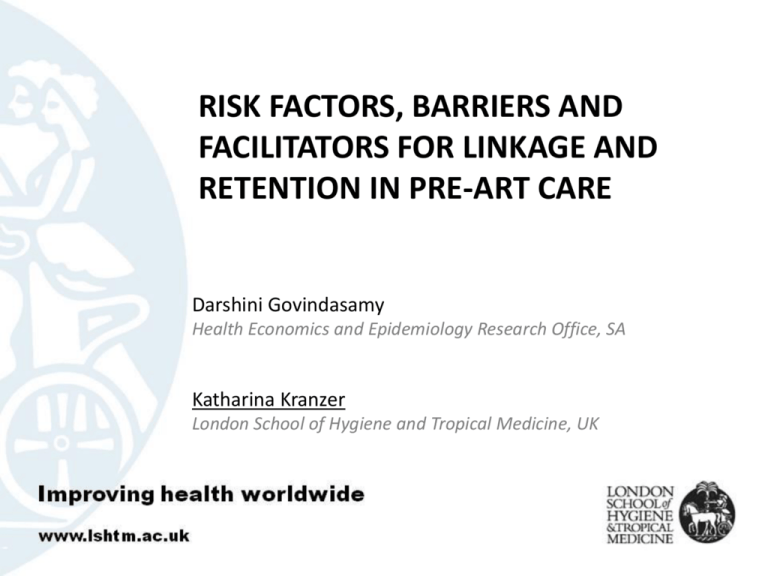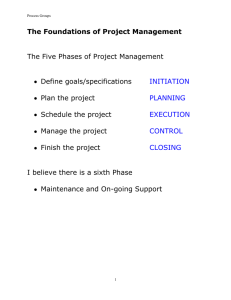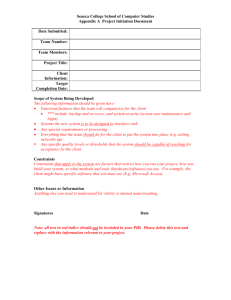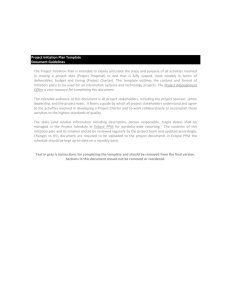Powerpoint
advertisement

RISK FACTORS, BARRIERS AND FACILITATORS FOR LINKAGE AND RETENTION IN PRE-ART CARE Darshini Govindasamy Health Economics and Epidemiology Research Office, SA Katharina Kranzer London School of Hygiene and Tropical Medicine, UK HIV continuum of care HIV testing Pre-ART care ART care Not in care Not in care eligible HIV infection HIV test Assessment for ART eligibility: • Clinical staging • CD4 count not yet eligible ART initiation Continuous lifelong ART Retention in preART care until eligible Kranzer et al 2012 HIV continuum of care HIV testing Pre-ART care ART care Not in care Not in care eligible HIV infection HIV test Assessment for ART eligibility: • Clinical staging • CD4 count not yet eligible ART initiation Continuous lifelong ART Retention in preART care until eligible Kranzer et al 2012 Systematic review 18 16 14 12 10 8 6 4 2 0 Search limited to sub-Saharan Africa studies published before May 2011 Total number of studies: 42 Semi-qualitative studies: 19 Quantitative 17 Qualitative 6 Barriers to retention in pre-ART care Health systems • Long waiting times • Shortage of HCWs Economic • Transport cost • Distance • Food shortage • Unable to take time of work Medical • TB treatment Psychosocial • Stigma • Fear of disclosure • Fear of drug toxicities • Perceived good health Govindasamy, Ford, Kranzer 2012 Predictors of attrition Economic • Transport cost • Distance Health systems • Shortage of HCWs Medical • TB treatment • Pregnancy • Advanced immunodeficiency • Severe malnutrition Other • Male sex • Younger age • Lower levels of education Govindasamy, Ford, Kranzer 2012 Predictors of attrition Economic • Transport cost • Distance Health systems • Shortage of HCWs Medical • TB treatment • Pregnancy • Advanced immunodeficiency • Severe malnutrition Other • Male sex • Younger age • Lower levels of education Govindasamy, Ford, Kranzer 2012 Men • Lower test uptake • Lower ART coverage • More advanced immunodeficiency at diagnosis and ART initiation • Higher mortality on ART • Lower adherence • Higher risk of loss to follow-up Johnson 2013, Cornell 2012, Druyts 2013, Peltzer 2009, Kranzer 2013, Johnson 2012, Muula 2009, Remien 2009 How to address gender inequality • Men do not become pregnant • Men are less health seeking • Health care staff are predominantly women • Health care services are targeted at women and children Health care services AIMED at men or "men friendly" health care services Areas for interventions Govindasamy, Ford, Kranzer 2012 Systematic review of interventions to improve linkage to and retention in pre-ART care N=11129 potentially eligible citations identified through: Search strategy on electronic databases (n=11 048) Keyword search on electronic conference abstract databases (n=45) References obtained from experts (n=36) N=67 of full text articles assessed for eligibility (54 published articles + 1 unpublished article from experts + 10 conference abstracts + 2 conference abstracts from experts) 24 studies retained for analysis (19 published articles + 1 unpublished article from experts + 2 conference abstracts + 2 conference abstracts from experts) Govindasamy, Kranzer 2013 Intervention studies - design and populations Before after studies: n=11 Observational studies with control group(s): n=6 Individuals randomized controlled trials: n=4 Cluster randomized controlled trials: n=3 Adults: n=11 Children: n=1 Adolescents: n=1 Pregnant women: n=8 Inpatients: n=1 TB patients: n=1 IVDU: n=1 Govindasamy, Kranzer 2013 Intervention studies - design and populations Before after studies: N=11 Observational studies with control group(s): n=6 Individuals randomized controlled trials: n=4 Cluster randomized controlled trials: n=3 Few studies with rigorous design Adults: n=11 Children: n=1 Adolescents: n=1 Pregnant women: n=8 Inpatients: n=1 TB patients: n=1 IVDU: n=1 Govindasamy, Kranzer 2013 Intervention studies - design and populations Before after studies: N=11 Observational studies with control group(s): n=6 Individuals randomized controlled trials: n=4 Cluster randomized controlled trials: n=3 Adults: n=11 Children: n=1 Adolescents: n=1 Pregnant women: n=8 Inpatients: n=1 TB patients: n=1 IVDU: n=1 Few studies with rigorous design Few studies in special risk groups Govindasamy, Kranzer 2013 Pregnant women No of studies Design Control - outcome Intervention: Integration Proportion of ART eligible women initiating ART Pfeiffer Observational Not presented Tsague studies 22/26 (85%) Stinson 61/130 (47%) Killam 103/716 (14%) Myer 58/271 (21%) Time to initiation of ART Van der Observational 56 days (30-103) Merwe studies Intervention: Health system intervention Proportion of ART-eligible women initiating ART Weigel Observational 2006 9/14 (64%) studies Youngleson 124/1243 (10%) Interventionoutcome Not presented 105/134 (78%) 124/227 (45%) 278/846 (33%) 183/214 (85%) Relative (95%CI) 1.58 (1.17; 2.14) 0.90 (0.7; 1.1) 0.62 (0.37; 1.04) 2.01 (1.37; 2.95) 4.00 (3.16; 5.05) Absolute -0.08 (-0.23; 0.08) 0.01 (-0.09; 0.11) 0.18 (0.14; 0.23) 0.64 (0.57; 0.71) 29 days (12-45) 2007 94/119 (79%) 1.23 (0.83; 1.84) 2008 84/101 (83%) 1.29 (0.87; 1.93) 2009 99/110 (90%) 1.40 (0.94; 2.08) 0.14 (-0.11;0.41) 0.19 (-0.07; 0.45) 0.26 (-0.0; 0.51) 122/486 (25%) 0.15 (0.11; 0.19) 2.52 (2.00; 3.16) Interventions and outcomes in special groups Intervention Number of studies Participants Design Outcome Food incentives 1 Children Before/after study Improved clinic attendance (RR 2.9) Health system intervention 1 TB patients Before/after study Increased ART initiation (HR 2.6) Food vouchers 1 IVDU RCT Time to initiation: 7 days (intervention) 58 days (control) Point of care CD4 count testing 1 adolescents Before/after study Time between HIV-testing and eligibility assessment: 14 days (control) and 0 days (intervention) Interventions and outcomes in adults Intervention No of studies Design Outcome Monthly visits with refill of cotrimoxazole 1 Before/after study Improved retention in pre-ART care (RR 2.6) Health system intervention 1 Before/after study Increased ART initiation (HR 2.7) Point of care or immediate CD4 count testing 3 1 before/after study 1 Individual RCT 1 Observation study with control group Increased retention and ART initiation (RR 2) PICT 1 Observation study with control group No effect on ART initiation (RR 0.9) Task shifting and decentralisation 1 Cluster RCT No effect on retention (RR 1.0) Intensive counselling 1 Individual RCT Increased pre-ART enrolment (RR 1.8) Home-based ART initiation 1 Cluster RCT Increased ART initiation rate (RR 2.9) Interventions addressing the barriers Psychosocial • Stigma • Fear of disclosure • Fear of drug toxicities • Perceived good health Economic • Transport cost • Distance • Food shortage • Unable to take time of work Health systems • Long waiting times • Shortage of HCWs Medical • TB treatment Interventions addressing the barriers Psychosocial • Stigma • Fear of disclosure • Fear of drug toxicities • Perceived good health Economic • Transport cost • Distance • Food shortage • Unable to take time of work Health systems • Long waiting times • Shortage of HCWs Medical • TB treatment Thank you!



